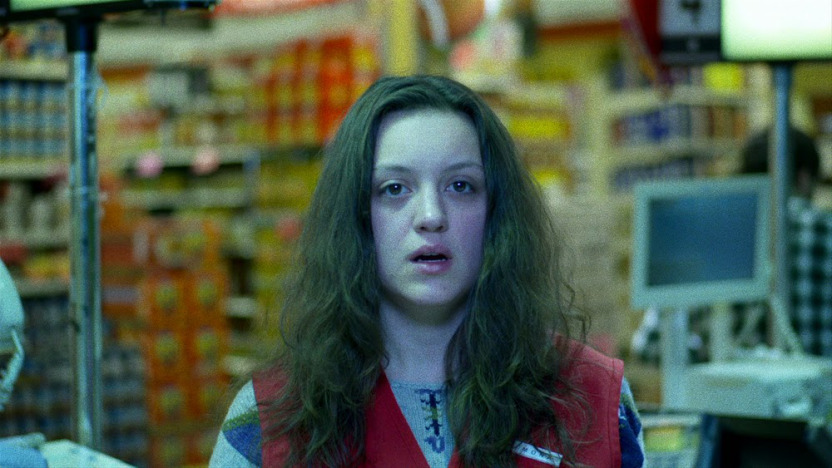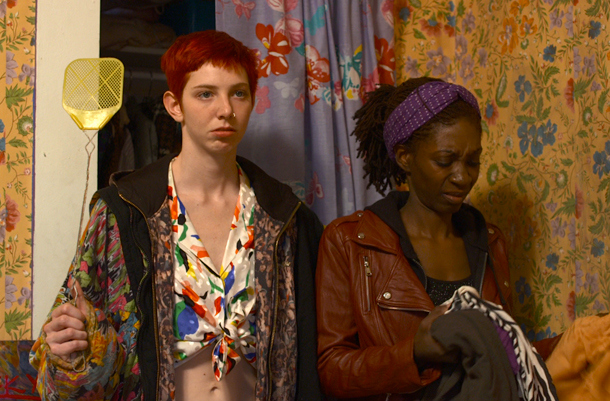By Benjamin Brown
Directed by Drew Tobia
“And remember: the passion for destruction is also a creative passion.”- Old Anarchist from Slacker.
The whole sub-genre of Mumblecore is one now firmly established within cinema. Essentially comprising of a low budget, lo-fi approach and typically shot in a highly naturalistic style, See You Next Tuesday is very much in this same vein. Also in the true spirit of Mumblecore it is preoccupied with social pariahs who live life on the margins, and the film’s protagonist Mona is for instance that quintessential social outcast; a heavily pregnant teenager.
The film opens with a (not quite) still, frontal shot of Mona in a grocery store; a beautiful tableau vivant that pictures her standing against shelves of produce rendered out of focus in the background. This very formalist arrangement is rather reminiscent of the image of Eva Khatchadourian in We Need to Talk About Kevin (2011), both in its location and in the fact that the two characters are rather pale and emaciated and wear these profoundly vacant, listless looks upon their faces; as if in some paralysing stupor both of their mouths are hanging slightly open.

Like Eva’s character after the killings, Mona cuts this isolated and isolating figure whose strange behaviour ostracises her from her co-workers who openly rile and ridicule her. It isn’t only at work however where she is subjected to abuse but even at home she’s in the firing line given that her mother, May, is both a raging alcoholic and also simply raging. One particular scene between Mona and her mother seems to perfectly encapsulate the volatile nature of their relationship. This is where, ironically after attending an AA meeting a drunk May launches into a profanity laden slew of verbal abuse that leaves Mona reeling. Its a thoroughly unsettling, uncomfortable watch but then of course its supposed to be, and as an audience we are left as stunned and stupefied as the helpless, hapless teen by this torrent of pure, uninhibited vitriol.
If taken in isolation this scene may indicate a genuinely abhorrent hatred for her own daughter, yet other scenes show a warmer, more nurturing side to May’s personality. What this is actually capturing may be a form of ‘tough love’, and the very dysfunctionality of their kinship is refreshingly un-Hollywood in its brokenness and brittleness. The scenes excessive nature also makes it obliquely comic, and numerous barbed, cynical quips also abound in SYNT such as one that alludes to societies prejudicial stance towards pregnant girls: ‘she’s a walking advertisement for birth control’.

Another politically charged piece of dialogue comes in a scene between Mona’s obnoxious, overbearing sister Jordan and her mild mannered writer lover Sylve. Of African/American origin, Sylve is shown to be perfectly complicit in engaging in role-play that positions her as the black slave and Jordan the master, and this highly potent dynamic does somehow manage to simultaneously raise serious issues to do with race and sexuality yet still be discomfortingly droll. Jordan completes this unholy trinity of damaged and neurotic individuals at the core of SYNT, and as a jobless, layabout twenty-something its almost as though she has strolled straight out of Richard Linklater’s proto-mumblecore film, Slacker (1991). Despite the film’s primary focus on Mona’s psychotic tendencies, Jordan does herself have her own moments of madness, as shown in a bar scene where she seems to take leave of all cognitive and motor senses entirely. Jordan’s wild, erratic behaviour is however the epitome of placidity when compared to events that unfold in a later sequence at a house-party populated by pretentious, nouveau riches socialites. In a seemingly deliberate attempt to épater la bourgeoisie, Mona throws a full blown tantrum over a lost trinket, and both for its gleeful undercutting of bourgeois social mores and for its vérité inflected jerky, hand-held cameras it seems to share considerable DNA with the Dogme 95 movement and Thomas Vinterberg’s The Celebration (1998). Alternatively, the scene also seemed to have shades of Curb Your Enthusiasm, again for its hand-held approach, but also for how like Larry David, Mona flies in the face of social etiquette.
Wickedly funny and with refreshingly unlikeable, unconventional characters, SYNT is a spiky, spunky and joyously irreverent affair that leaves one gasping for breath yet gagging for more.
Watch ‘See You Next Tuesday’ at FilmDoo now (UK & Ireland only)





